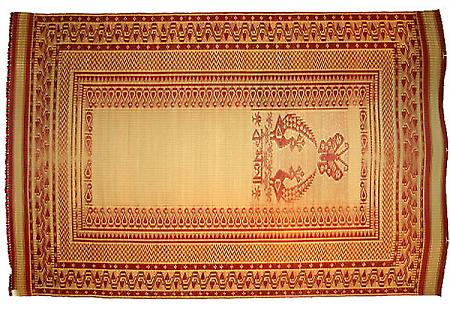
THE MAT (MADUR)
India, 2005, 76 minutes, Colour.
The Mat is a small-budget Bengali film, a direct contrast to the films made from Bollywood, more in the vein of small-budget and serious Iranian films.
The film is set in a remote village amongst mat-makers. The film recreates the life of the village, the personalities, the hardships, the gossip. It also highlights the precarious nature of the mat-making industry with the coming of factories. However, there are talented artists in the countryside.
The film moves from social comment into rather intense personal drama, understated in its dialogue and visuals. The wife of the mat-maker is attracted to the young man who comes to the village looking for mats. This precipitates a crisis in the marriage – showing that human nature is the same in the village and in the city. However, the whole matter is treated with great delicacy – with black and white flashbacks for the torment of the husband, with looks and touches between the couple. The ending is striking in the action of the woman – with the moral that money does not matter, but love and family.
1. Indian film-making? Bengali film-making? Seriousness, simplicity, values?
2. The portrayal of the village, the environment, nature, the homes, the workplace? The musical score?
3. The social view of the village, its people, poverty, making ends meet?
4. The personal and psychological drama in this context? Handled with delicacy? Intensity?
5. The title, the actual mat, its beauty, its symbol of Isad, his life, work? Its being for his wife? Not selling, the bids from the salesman? The symbolism of the mat – especially the ending?
6. The philosophy of life, values, the wife and wanting money, future for her children, practical, contrasting the dreams of her idealistic husband?
7. Isad and the opening song, his joy, a poet? Forgetting the vegetables, borrowing them from his friend? His wife and her scolding? The children and their laughter? The meals, his work? Making the mat? Teaching his art to his son? The villagers, the talk and the workers?
8. The portrait of the wife, scolding, practical, her attitude towards the mat, ensuring a future for her son, exasperated with her husband? The family, the four children, the sexual relationship?
9. Industry and craft, the coming of the factories, the individuals and their skills, their art? A dying art?
10. The salesman, his stepping on the children’s castle, apologies, winning over the children, persuaded to stay, sharing the meals, attracted to the wife, his many visits, staying, the gifts, the jewellery for the wife, the toys for the children? Holding the wife’s hand, asking her to eat so he would not eat alone?
11. Assad, the gossip amongst the workers, the fish and the bangles as gifts from the salesman, people laughing at him, the black and white flashbacks and his feelings, his going out to walk, seeing the salesman touch his wife’s hand?
12. The decision to sell the mat, getting it out, his feelings, the reasons for selling, its loss of the symbolism that it had for him?
13. The wife, her reaction to this news, the salesman and his buying the mat, the wife rushing to buy it back, throwing the money away – and the freeze-frame as she was hurrying back to Assad?
14. The film working at various levels, social, psychological, moral?